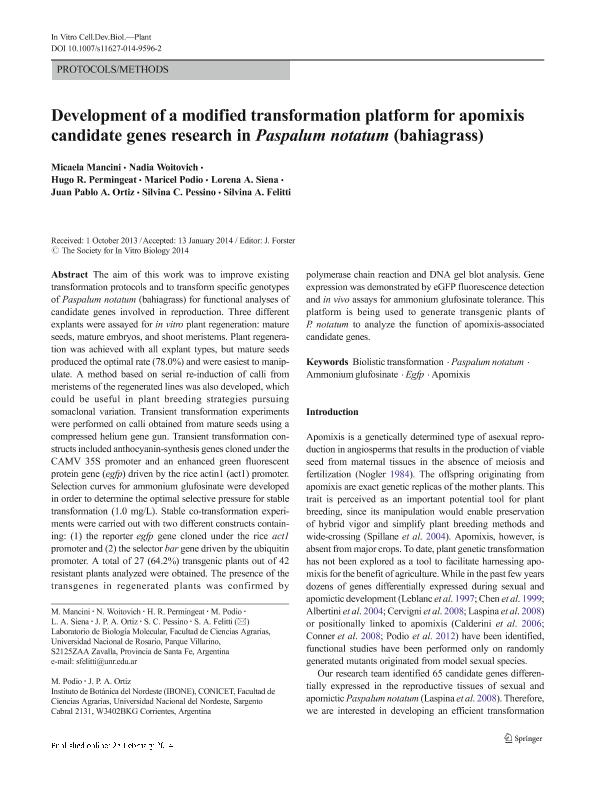Artículo
Development of a modified transformation platform for apomixis candidate genes research in Paspalum notatum (bahiagrass)
Mancini, Micaela ; Woitovich Valetti, Nadia
; Woitovich Valetti, Nadia ; Permingeat, Hugo Raúl; Podio, Maricel
; Permingeat, Hugo Raúl; Podio, Maricel ; Siena, Lorena Adelina
; Siena, Lorena Adelina ; Ortiz, Juan Pablo Amelio
; Ortiz, Juan Pablo Amelio ; Pessino, Silvina Claudia
; Pessino, Silvina Claudia ; Felitti, Silvina Andrea
; Felitti, Silvina Andrea
 ; Woitovich Valetti, Nadia
; Woitovich Valetti, Nadia ; Permingeat, Hugo Raúl; Podio, Maricel
; Permingeat, Hugo Raúl; Podio, Maricel ; Siena, Lorena Adelina
; Siena, Lorena Adelina ; Ortiz, Juan Pablo Amelio
; Ortiz, Juan Pablo Amelio ; Pessino, Silvina Claudia
; Pessino, Silvina Claudia ; Felitti, Silvina Andrea
; Felitti, Silvina Andrea
Fecha de publicación:
08/2014
Editorial:
Springer
Revista:
In Vitro Cellular
ISSN:
1054-5476
Idioma:
Inglés
Tipo de recurso:
Artículo publicado
Clasificación temática:
Resumen
The aim of this work was to improve existing transformation protocols and to transform specific genotypes of Paspalum notatum (bahiagrass) for functional analyses of candidate genes involved in reproduction. Three different explants were assayed for in vitro plant regeneration: mature seeds, mature embryos, and shoot meristems. Plant regeneration was achieved with all explant types, but mature seeds produced the optimal rate (78.0%) and were easiest to manipulate. A method based on serial re-induction of calli from meristems of the regenerated lines was also developed, which could be useful in plant breeding strategies pursuing somaclonal variation. Transient transformation experiments were performed on calli obtained from mature seeds using a compressed helium gene gun. Transient transformation constructs included anthocyanin-synthesis genes cloned under the CAMV 35S promoter and an enhanced green fluorescent protein gene (egfp) driven by the rice actin1 (act1) promoter. Selection curves for ammonium glufosinate were developed in order to determine the optimal selective pressure for stable transformation (1.0 mg/L). Stable co-transformation experiments were carried out with two different constructs containing: (1) the reporter egfp gene cloned under the rice act1 promoter and (2) the selector bar gene driven by the ubiquitin promoter. A total of 27 (64.2%) transgenic plants out of 42 resistant plants analyzed were obtained. The presence of the transgenes in regenerated plants was confirmed by polymerase chain reaction and DNA gel blot analysis. Gene expression was demonstrated by eGFP fluorescence detection and in vivo assays for ammonium glufosinate tolerance. This platform is being used to generate transgenic plants of P. notatum to analyze the function of apomixis-associated candidate genes.
Palabras clave:
AMMONIUM GLUFOSINATE
,
APOMIXIS
,
BIOLISTIC TRANSFORMATION
,
EGFP
,
PASPALUM NOTATUM
Archivos asociados
Licencia
Identificadores
Colecciones
Articulos(CCT - ROSARIO)
Articulos de CTRO.CIENTIFICO TECNOL.CONICET - ROSARIO
Articulos de CTRO.CIENTIFICO TECNOL.CONICET - ROSARIO
Articulos(IBONE)
Articulos de INST.DE BOTANICA DEL NORDESTE (I)
Articulos de INST.DE BOTANICA DEL NORDESTE (I)
Citación
Mancini, Micaela; Woitovich Valetti, Nadia; Permingeat, Hugo Raúl; Podio, Maricel; Siena, Lorena Adelina; et al.; Development of a modified transformation platform for apomixis candidate genes research in Paspalum notatum (bahiagrass); Springer; In Vitro Cellular; 50; 4; 8-2014; 412-424
Compartir
Altmétricas



